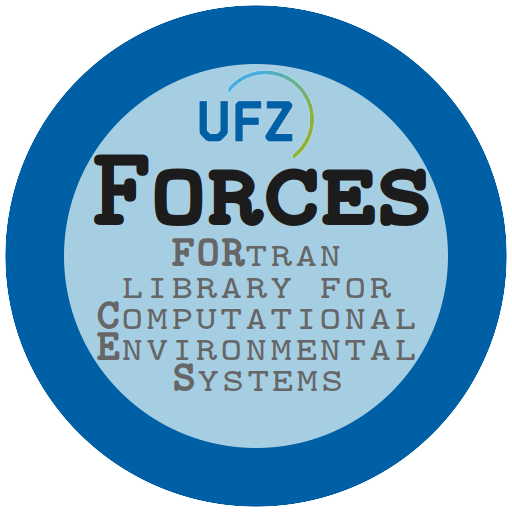 |
FORCES
FORtran lib for Comp. Env. Sys.
|
 |
FORCES
FORtran lib for Comp. Env. Sys.
|
This module is Monte Carlo Markov Chain sampling of a posterior parameter distribution (measurement errors are either known or modeled). More...
Public Member Functions | |
| subroutine | mcmc_dp (eval, likelihood, para, rangepar, mcmc_paras, burnin_paras, seed_in, printflag_in, maskpara_in, restart, restart_file, tmp_file, loglike_in, paraselectmode_in, iter_burnin_in, iter_mcmc_in, chains_in, stepsize_in) |
This module is Monte Carlo Markov Chain sampling of a posterior parameter distribution (measurement errors are either known or modeled).
Sample posterior parameter distribution with Metropolis Algorithm.
This sampling is performed in two steps, i.e. the burn-in phase for adjusting model dependent parameters for the second step which is the proper sampling using the Metropolis Hastings Algorithm.
This sampler does not change the best parameter set, i.e. it cannot be used as an optimiser.
However, the serial and the parallel version give therefore the bitwise same results.
1. Burn in phase: Find the optimal step size
Purpose:
Find optimal stepsize for each parameter such that the acceptance ratio converges to a value around 0.3.
Important variables:
| Variable | Description |
|---|---|
| burnin_iter | length of markov chain performed to calculate acceptance ratio |
| acceptance ratio | ratio between accepted jumps and all trials (LEN) |
| acceptance multiplier | stepsize of a parameter is multiplied with this value when jump is accepted (initial : 1.01) |
| rejection multiplier | stepsize of a parameter is multiplied with this value when jump is rejected (initial : 0.99 |
| and will never be changed) | |
| stepsize | a new parameter value is chosen based on a uniform distribution |
| pnew_i = pold_i + Unif(-stepsize_i, stepsize_i) (initial : stepsize_i = 1.0 for all i) |
Algorithm:
2. Monte Carlo Markov Chain: Sample posterioir distribution of parameter
Purpose:
use the previous adapted stepsizes and perform ONE monte carlo markov chain
the accepted parameter sets show the posterior distribution of parameters
Important variables:
| Variable | Description |
|---|---|
| iter_mcmc | length of the markov chain (>> iter_burnin) |
| stepsize | a new parameter value is chosen based on a uniform distribution |
pnew_i = pold_i + Unif(-stepsize_i, stepsize_i) use stepsizes of the burn-in (1)
Algorithm:
Example
See also example in test directory.
Literature
| [in] | real(dp) :: likelihood(x) | Interface Function which calculates likelihood of given parameter set x |
| [in] | real(dp) :: para(:) | Inital parameter set (should be GOOD approximation of best parameter set) |
| [in] | real(dp) :: rangePar(size(para),2) | Min/max range of parameters |
| [in] | integer(i8), optional :: seed_in | User seed to initialise the random number generator (default: none --> initialized with timeseed) |
| [in] | logical, optional :: printflag_in | Print of output on command line (default: .False.) |
| [in] | logical, optional :: maskpara_in(size(para)) | Parameter will be sampled (.True.) or not (.False.) (default: .True.) |
| [in] | character(len=*), optional :: tmp_file | filename for temporal data saving: every iter_mcmc_in iterations parameter sets are appended to this file the number of the chain will be prepended to filename output format: netcdf (default: no file writing) |
| [in] | logical, optional :: loglike_in | true if loglikelihood function is given instead of likelihood function (default: .false.) |
| [in] | integer(i4), optional :: ParaSelectMode_in | How many parameters will be changed at once?
|
| [in] | integer(i4), optional :: iter_burnin_in | Length of Markov chains of initial burn-in part (default: Max(250, 200*count(maskpara)) ) |
| [in] | integer(i4), optional :: iter_mcmc_in | Length of Markov chains of proper MCMC part (default: 1000 * count(maskpara) ) |
| [in] | integer(i4), optional :: chains_in | number of parallel mcmc chains (default: 5_i4) |
| [in] | real(dp), DIMENSION(size(para,1)), optional :: stepsize_in | stepsize for each parameter if given burn-in is discarded (default: none --> adjusted in burn-in) |
| [out] | real(dp), allocatable :: mcmc_paras(:,:) | Parameter sets sampled in proper MCMC part of algorithm |
| [out] | real(dp), allocatable :: burnin_paras(:,:) | Parameter sets sampled during burn-in part of algorithm |
Definition at line 203 of file mo_mcmc.F90.
| subroutine mo_mcmc::mcmc::mcmc_dp | ( | procedure(eval_interface), intent(in), pointer | eval, |
| procedure(objective_interface), intent(in), pointer | likelihood, | ||
| real(dp), dimension(:), intent(in) | para, | ||
| real(dp), dimension(:, :), intent(in) | rangepar, | ||
| real(dp), dimension(:, :), intent(out), allocatable | mcmc_paras, | ||
| real(dp), dimension(:, :), intent(out), allocatable | burnin_paras, | ||
| integer(i8), intent(in), optional | seed_in, | ||
| logical, intent(in), optional | printflag_in, | ||
| logical, dimension(size(para, 1)), intent(in), optional | maskpara_in, | ||
| logical, intent(in), optional | restart, | ||
| character(len = *), intent(in), optional | restart_file, | ||
| character(len = *), intent(in), optional | tmp_file, | ||
| logical, intent(in), optional | loglike_in, | ||
| integer(i4), intent(in), optional | paraselectmode_in, | ||
| integer(i4), intent(in), optional | iter_burnin_in, | ||
| integer(i4), intent(in), optional | iter_mcmc_in, | ||
| integer(i4), intent(in), optional | chains_in, | ||
| real(dp), dimension(size(para, 1)), intent(in), optional | stepsize_in | ||
| ) |
Definition at line 433 of file mo_mcmc.F90.